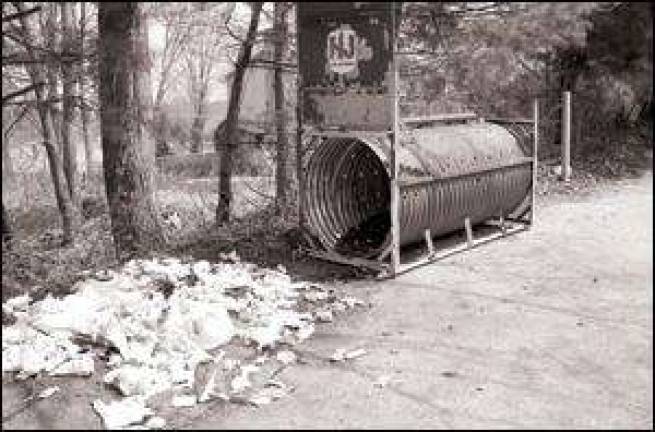State officials set trap for bear at Lake Wanda daycare center

Vernon - For months, a bear has been pillaging the dumpster at a Lake Wanda daycare center on the corner of Paddock and Canistear Roads, and the owner wants to see the animal trapped and deported to a faraway location. So far, the bear has eluded capture. “The bears were here before us,” said Tom Jones, who was picking up his three-year-old daughter Julia from day care. “I don’t want Julia to grow up thinking that bears live only in zoos, but the children’s safety has to come first and this bear has been a problem for a long time.” Jones said he wanted to make it clear that he is 100 percent behind the effort to trap the bear. “I don’t want to see it killed. I do want to see it gone,” he said. To keep the bear out of the dumpster, daycare center owner Sarah Bruce Elder surrounded it with a wooden picket fence. When the bear tore off some of the slats and extracted garbage bags through the opening, Elder decided she’d had enough, and called in the state officials for help. Last week, fish and wildlife officials installed a bear trap in the parking lot near the dumpster, and poured bacon grease in the area as an added lure. A pile of soiled diapers - an alluring scent to bears - also was strewn before the opening of the trap. Local animal-rights advocates say that Elder has been enticing the bears by managing the center’s garbage poorly, and they’ve called upon N.J. Department of Environmental Protection Commissioner Lisa Jackson to spare the bear and enforce the new garbage-management policies. Lake Wanda resident and animal-rights activist Susan Kehoe provided this newspaper with photographs that showed the dumpster overflowing with garbage bags, with other bags stacked in front of the dumpster on the ground. After Kehoe filed a complaint with the Vernon health department, daycare center workers cleaned up the diapers in front of the bear trap. Elder, a life-long resident of Sussex County and a six-year resident of Highland Lakes, says she is well aware of the presence of bears in the area. “The safety of the 90 children in my care comes first,” Elder said. “We’ve had a problem with bears since the time I started the daycare center four years ago. Last year, a bear ripped down the fence around the rear playground, and every day, we have to pick up garbage the bear has strewn around. My workers have reported seeing a huge bear prowling around the building at 6:15 in the morning when they come to work, and they’re afraid to get out of their cars.” Elder praised the state officials for their willingness to work with her to solve the problem, and she said that if she had known the picket fence would be inadequate, she would have erected a more secure fence. State spokeswoman Darlene Yuhas said that environmental officials are working with Elder to help her come up with a bear-proof method for garbage management. To begin with, the dumpster must be secured by a tough, chained metal lid, and the area surrounded by a tall chain link fence bears can’t climb. All the garbage must be contained within the dumpster. Although the state has threatened to fine persistent bear-tempters as much as $1,000, Yuhas said that the state is in no hurry to issue citations but would prefer to educate the public about the issue. The state legislature is considering a law that would make it an offense to feed bears accidentally by enticing them with appetizing garbage. Deliberately feeding bears already is illegal. “The state is very serious about keeping bears out of residential areas by educating residents to keep garbage out of their reach,” Yuhas said, adding that when some bears get used to dumpster dining, they may become incorrigible. The state then dubs them “nuisance bears,” and officials may have to destroy them. “Relocating or killing nuisance bears is time-consuming and expensive, and the department would prefer not to have to use valuable and limited resources to settle the problem,” she concluded. The state is still conducting education missions in bear country in an effort to teach residents to keep bears away from neighborhoods by keeping tempting garbage away from bears. As a campaign promise, Gov. Jon Corzine said he would halt the bear hunt, and N.J. Department of Environmental Commissioner Lisa Jackson has put into effect a campaign to educate residents of bear country about how to avoid close encounters with bears. The campaign will cost a little less than one million dollars. In 2003, the state authorized the first bear hunt in 30 years, and in December 2005 allowed a second hunt to take place.